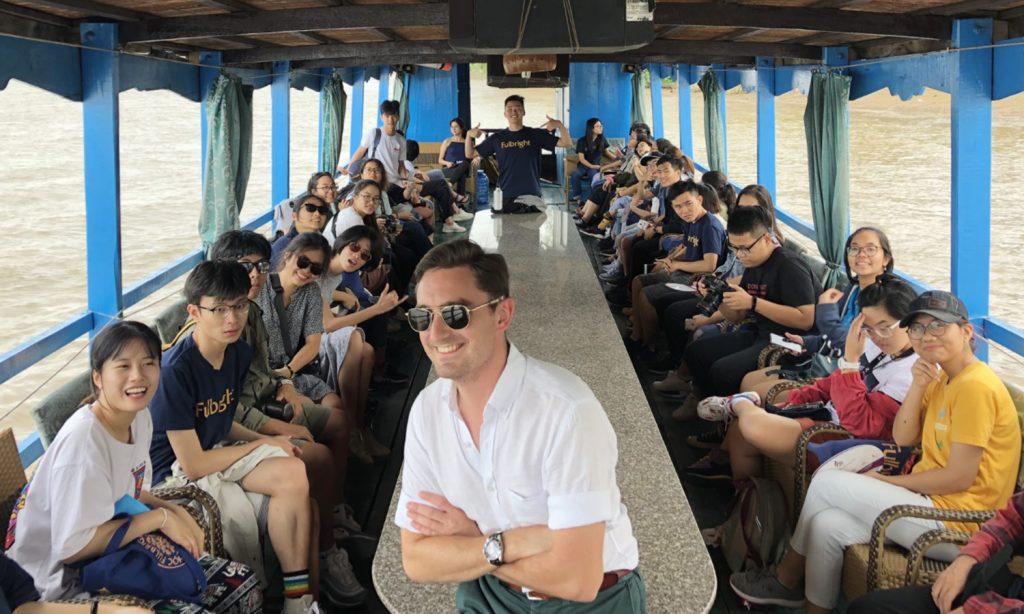
From October 18 to 20, 40 Fulbright University Vietnam students had the opportunity to discover Ben Tre province with their professors. The field trip was the final component and culmination of our Vietnamese Studies course, which examines the cultural, socio-economic, and political changes in Vietnam from the Nguyen Dynasty until now, and what forces shaped Vietnam into the nation it is today. The course and the field study were designed and organized by Vietnamese Studies professors Dr. Nam Nguyen and Dr. Andrew Bellisari.
A coastal province in the Mekong Delta, Bến Tre is renowned for its revolutionary heritage and remembered as a crucible of Vietnam’s history and identity: “here lie the tombs of prominent scholars Nguyễn Đình Chiểu and Phan Thanh Giản as well as the heroic female general Nguyễn Thị Định. It is also home of the Coconut Sect, and the birthplace of Trương Vĩnh Ký,” explains Dr. Nguyen.

Dr. Nam Nguyen
“This was a perfect opportunity for us to go to the source, so students can listen to local perspectives, making Vietnam the classroom. By engaging profoundly with a local context, we open broader discussions of Vietnamese history.” remarks Dr. Bellisari.
Local memory, national identity
Students visited the tombs and memorials of foundational figures of Modern Vietnam, be they Confucian scholars, literary masters, pacifists or military, from the pre-colonial and colonial eras, to legendary figures of Vietnam’s revolutionary tradition. Each story began in Bến Tre, but not all are remembered equally. The first goal was to reflect on the historical role they played, and to see it through the local lens.
“What we were learning came to life. We had the chance to follow traditional tours, and we also received more personal perspectives,” says Phuong Thao, one of the participants. Mai Anh, who also participated in the trip, added: “Going to the birthplace of prominent figures and the seat of historical happenings is different from studying them from textbooks. You can connect more with their motivations.”
“Everyone has their own thoughts and ways to worship and recognize contributions to history. We learned so much by seeing how the people in their hometown perceive historical figures, how they care for the tombs, and how they carry on their names,” says Thao.

Phuong Thao (white top) and her classmates at Nguyen Thi Dinh memorial complex
The students were encouraged to discuss the plurality and conflicting nature of those perspectives both historical and present as well as connect it with national history and contemporary Vietnam.
For Mai Anh, “the trip really made us think on how we perceive the past, how perspectives change, but also how it relates to the present and people now.”
From history to civic engagement
Indeed, discussions on historical perspectives inevitably open to the present, and how students can engage with a continuously evolving society. A key element of the field trip was to develop within the class a sense of civic engagement.
“Learning about historical events gives me something to talk about with people from previous generations, and it’s a privilege to learn from them. In addition, hearing different perspectives and learning independently gives it a mutual, reciprocal aspect, where I can engage in this dialogue. It’s a valuable experience to have these conversations with people who lived through the revolutionary period,” reflects Mai Anh.

Mai Anh (green top) talking with her professor and friends
For Phuong Thao, “it’s not just about conversations: it’s about how you can understand and empathize with people. When discussing history, we can discuss the why. Why people acted the way they did or made the decisions they made. And it’s a huge source of motivation for me. We can’t build the future without understanding the past. Nationalism is not just about building a sense of identity; it’s about understanding different ideas of Vietnam and our past and build a future together.”
Final presentations: in the steps of historians
To complete their course, students produced a final presentation, continuing the work of historians and contributing to the ongoing dialogue within Vietnamese society. Groups chose their topic independently, ranging from cataloguing and preserving the cultural heritage of Dong Khoi Street in Ho Chi Minh city, to discussing the life of Vietnamese workers in France during the first and second world war, or gathering oral history accounts of post-war Vietnam in the subsidy period.
“The final project was planned beforehand, but Bến Tre gave us time and distance for reflection. For my group, we chose to do an essay film inspired by the one showed to us by professor Nam at the beginning of the course. In terms of researching methods, the frequent check-ins with professors Nam and Andrew were invaluable. They really helped us find sources and question and sharpen our investigative methods, nudging us on the right path of independent thought,” says Mai Anh.

Dr. Bellisari and the students of the Vietnamese studies class
For Andrew Bellisari, this was a success. “The final projects, much like the trip, showed the students that history exists in different registers, where the local, national, and international can coexist in multiple narratives. This was constantly emphasized towards the course, but the trip and the project gave the students a hands-on experience they would not usually have to research and engage with these narratives.”







